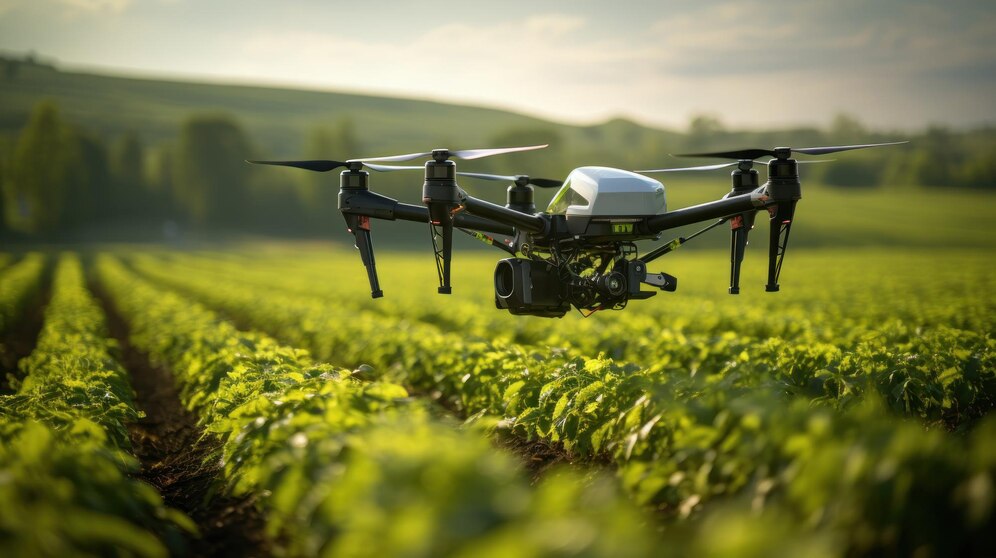The Role of Agricultural Drones in Sustainable Farming

In recent years, agricultural drones have emerged as a transformative tool in farming, enabling sustainable practices and improving productivity. This article explores how these innovative technologies contribute to sustainable agriculture, the advantages they offer, and some challenges that come with their use.
Understanding Agricultural Drones
Agricultural drones, often referred to as “kisan drones” or “agri drones,” are unmanned aerial vehicles (UAVs) equipped with advanced sensors and cameras. They help farmers monitor their crops, assess field conditions, and manage resources more efficiently. With the ability to collect real-time data from above, drones are revolutionizing traditional farming methods.
Enhancing Crop Monitoring and Data Collection
One of the primary benefits of drones in agriculture is their ability to gather detailed information about crop health. Equipped with sensors, they can assess soil moisture levels, temperature variations, and even identify pest infestations early on. This allows farmers to make informed decisions about irrigation, fertilization, and pest control, ultimately leading to better crop yields.
Cost-Effectiveness and Resource Management
Using drones can significantly reduce operational costs for farmers. By automating tasks such as monitoring large fields, drones minimize the need for manual labor, which can be time-consuming and expensive. Additionally, drones facilitate precise applications of fertilizers and pesticides, ensuring that resources are used efficiently and only where needed. This not only saves money but also lessens the environmental impact of farming practices.
Accessibility and Efficiency
Drones excel in accessing hard-to-reach areas, such as steep terrains or large fields. This ability is particularly beneficial for farmers managing diverse landscapes. Drones can cover large areas in a short amount of time, improving the efficiency of farm operations. By using drones, farmers can quickly identify problem areas, making it easier to address issues before they escalate.
Supporting Sustainable Practices
Agricultural drones promote sustainability in several ways. By reducing the overuse of chemicals through targeted applications, drones help minimize environmental pollution. Moreover, they assist in managing water resources more effectively, reducing wastage, and ensuring that crops receive the right amount of moisture. Early detection of diseases and pests allows for timely interventions, reducing the likelihood of crop loss and enhancing food security.
Challenges to Consider
While the benefits of agricultural drones are substantial, several challenges must be addressed:
- Regulatory Restrictions: Compliance with aviation regulations can be a hurdle for farmers looking to adopt drone technology.
- Initial Investment: The upfront costs of purchasing drones and the necessary sensors can be significant, which might deter small-scale farmers.
- Training Requirements: Proper training is essential for effective drone operation, requiring time and resources that some farmers may find challenging to allocate.
- Technical Limitations: Issues such as battery life and sensitivity to weather conditions can affect the operational efficiency of drones.
Conclusion
Agricultural drones are redefining farming practices by promoting efficiency and sustainability. With their ability to enhance crop monitoring, reduce operational costs, and support eco-friendly practices, drones have become essential tools for modern farmers. However, overcoming regulatory, financial, and technical challenges is crucial for maximizing their potential.
For those interested in exploring agricultural drones, Dhaksha Drones offers a range of innovative agri drones designed to meet the needs of today’s farmers. Check out their offerings to see how they can enhance your farming operations!
FAQ
1: What are agricultural drones used for?
Answer: Agricultural drones are primarily used for crop monitoring, soil analysis, irrigation management, and precision application of fertilizers and pesticides. They help farmers gather real-time data to improve crop yields and make informed decisions.
2: How do drones improve efficiency in farming?
Answer: Drones enhance efficiency by automating tasks such as field mapping and crop health assessments, allowing farmers to cover large areas quickly and accurately. This reduces the time and labor required for traditional farming practices.
3: Are agricultural drones expensive?
Answer: The initial cost of agricultural drones can be significant, including the price of the drone itself and necessary sensors. However, many farmers find that the long-term savings on labor and inputs justify the investment.
4: Do I need special training to operate agricultural drones?
Answer: Yes, operating agricultural drones typically requires training to ensure safe and effective use. Farmers may need to familiarize themselves with drone regulations and operational best practices.
5: How do drones contribute to sustainable farming?
Answer: Drones promote sustainability by enabling precise applications of fertilizers and pesticides, minimizing chemical runoff, and optimizing water usage. They also facilitate early detection of pests and diseases, reducing crop loss and improving food security.
– Top Benefits of Using Bio Products in Sustainable Agriculture








